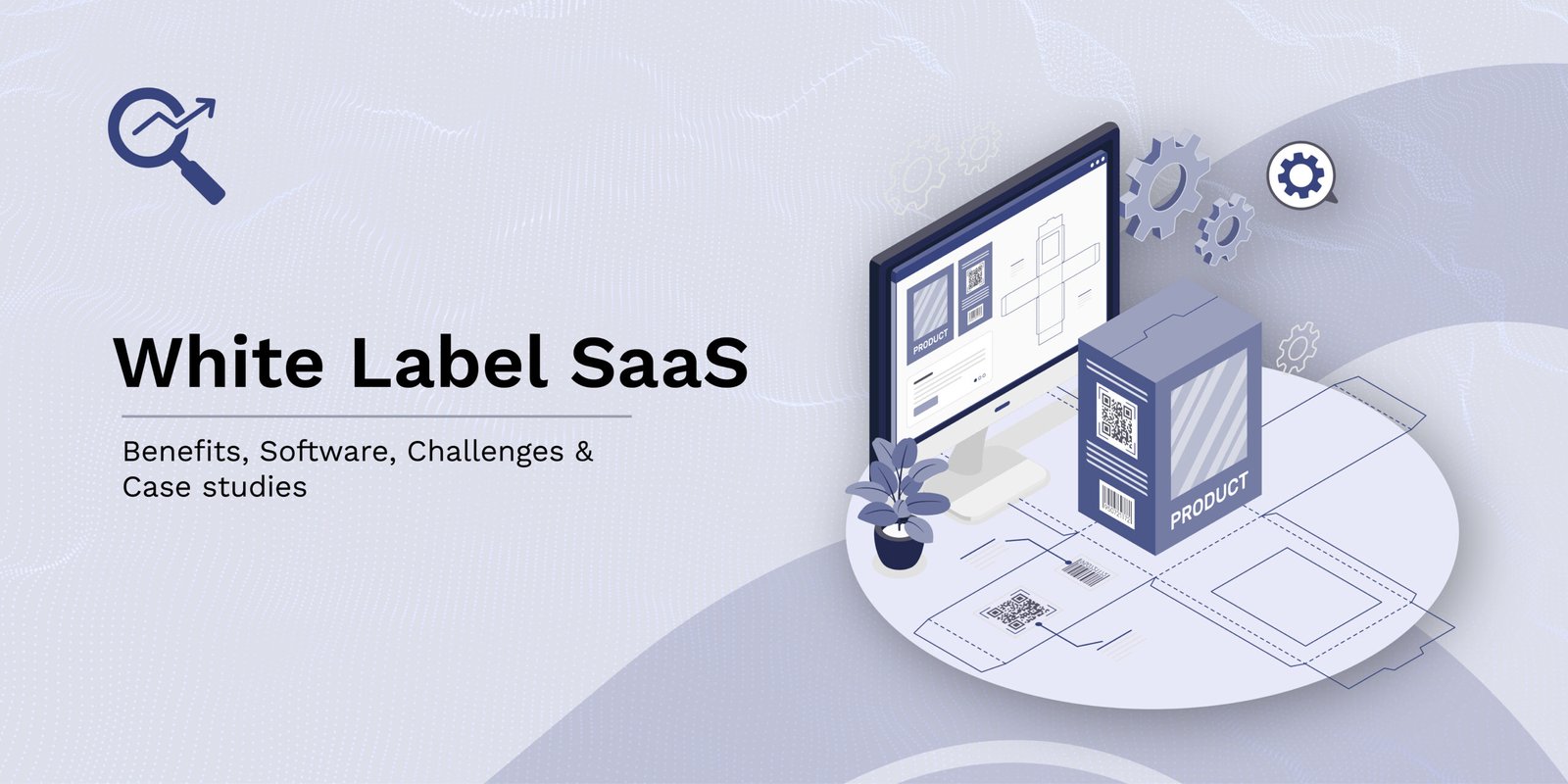Imagine launching your own branded software—without writing a single line of code or spending months on development. Sounds like a dream, right? That’s exactly what White Label SaaS makes possible.
In simple terms, White Label SaaS (Software as a Service) is a business model where you take a ready-made software solution, rebrand it as your own, and offer it to your customers. It’s like having the power of a tech company—without actually being one.
And in today’s digital world, where everything from marketing to customer support depends on tech tools, white-label SaaS is more than just convenient—it’s a serious growth hack.
Businesses today are moving fast. They don’t have time (or budget) to build complex software from the ground up. Whether its agencies adding new services, startups looking for quicker go-to-market strategies, or entrepreneurs wanting to sell digital products—white-label SaaS is becoming the go-to shortcut to scale, sell, and stand out.
But here’s the thing: not all white-label platforms are created equal. And while the model offers huge benefits, it also comes with its own challenges.
In this guide, we’re breaking it all down for you:
- What white-label SaaS actually means (without the tech jargon)
- Why it’s booming right now
- The biggest pros, hidden challenges, and who it’s really for
- And a curated list of the top white-label SaaS platforms to check out in 2025
If you’re thinking about growing your business with smart, scalable software—this guide is your starting point.
What is White Label SaaS?
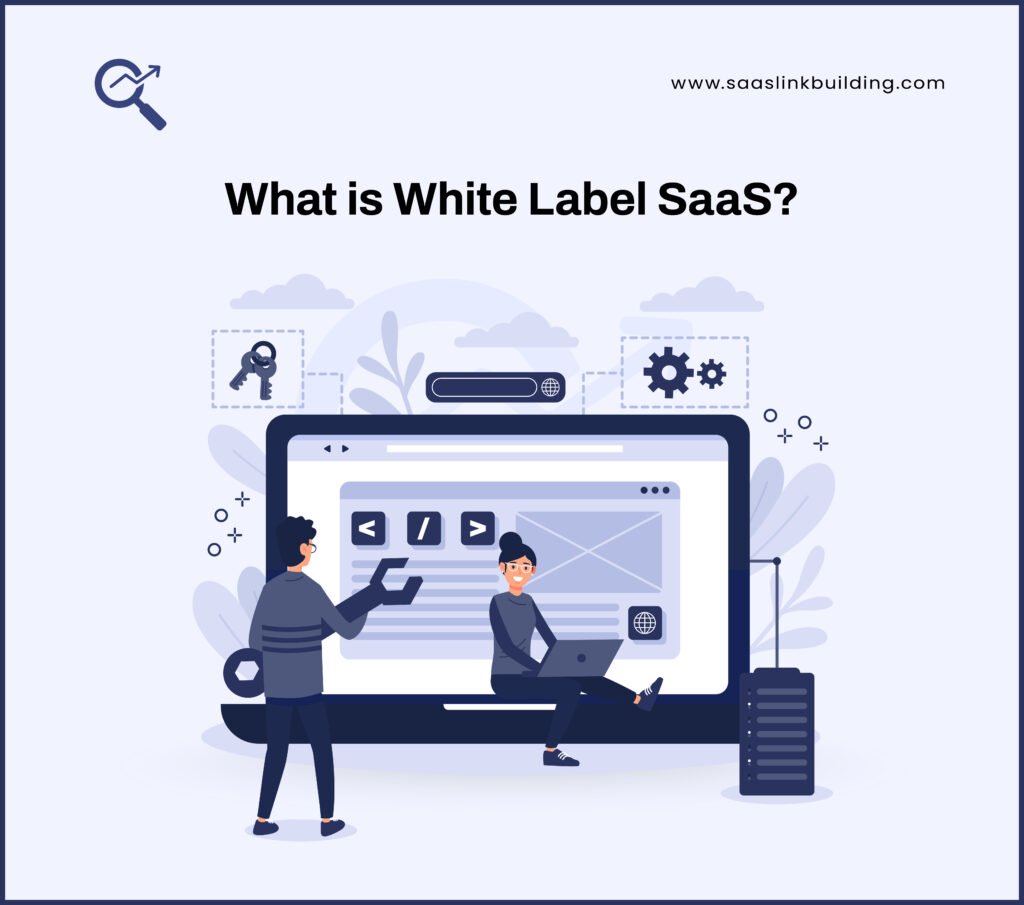
Let’s break it down in the simplest way possible.
White Label SaaS (Software as a Service) is when a company creates a fully-developed software product—and then lets other businesses rebrand it as their own.
You get all the functionality, features, and infrastructure of a powerful tool—without building it yourself. Just add your branding (logo, name, domain), customize a few settings, and boom—it looks and feels like a product you built from scratch.
It’s a plug-and-play business model that gives you a head start without the headaches of coding, maintenance, or hiring a dev team.
Key Characteristics of White Label SaaS
- Rebrandable: The original creator stays invisible. Your clients only see your brand.
- Ready-to-use: No development time. Launch in days, not months.
- Scalable: Handle more clients, offer new services, or grow faster—without extra work.
- Cost-effective: Say goodbye to high development costs and ongoing tech hassles.
- Supported: The original SaaS provider usually handles backend updates, hosting, and security.
Real-Life Example
Let’s say a company builds a social media scheduling tool. Instead of marketing it under their name, they let agencies or freelancers rebrand it, set their own pricing, and sell it as their own product to clients.
Your client thinks you’ve built this amazing software—when really, you’re partnering smart with a white-label SaaS provider behind the scenes.
In short: White Label SaaS is a brilliant shortcut for launching your own software solution—minus the hassle of building and maintaining it. And in the sections ahead, we’ll explore how to actually make it work for your business.
Benefits of White Label SaaS
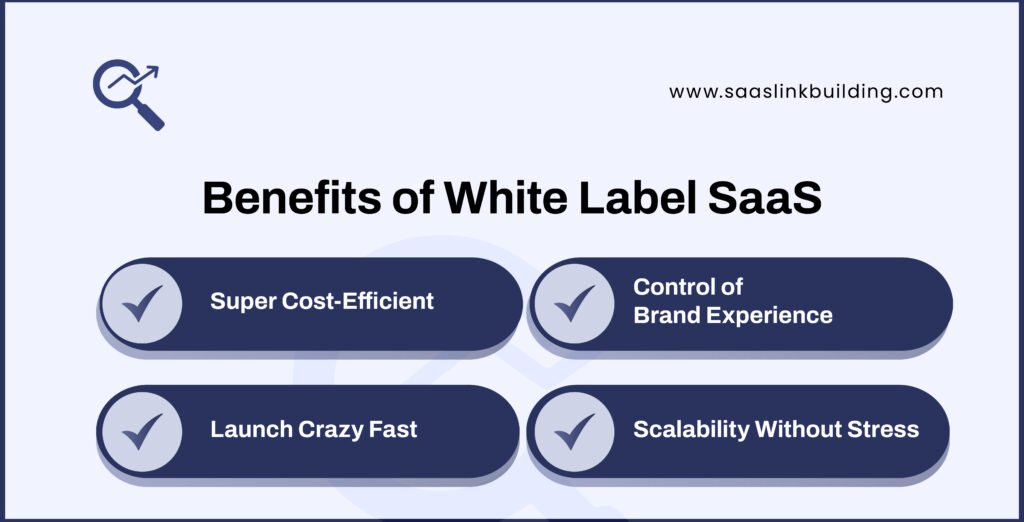
Let’s be real—building software from scratch is hard. It takes time, money, a skilled tech team, and a lot of patience (and coffee). That’s exactly why white-label SaaS is such a game-changer for businesses today.
Whether you’re running an agency, launching a side hustle, or just looking to expand your services, white-label SaaS lets you skip the hardest parts and go straight to growing your brand. Here’s why it works so well:
1. It’s Super Cost-Efficient
One of the biggest reasons people love white-label SaaS? You don’t have to break the bank. Instead of spending thousands (sometimes even hundreds of thousands) on building your own software, you pay a flat monthly or annual fee for something that’s already built and ready to go.
It’s like renting a fully furnished office instead of constructing your own building. Way easier, right?
2. You Can Launch Crazy Fast
Speed matters. The longer you wait to launch, the more opportunities you miss.
With white-label SaaS, you don’t need to wait months to get started. In fact, in many cases, you can go live within days. The product’s done—you just add your branding, tweak a few things, and you’re ready to roll.
Fast time-to-market = faster growth + faster revenue.
3. You Control the Brand Experience
Here’s where it gets fun: you get to make the product look and feel like your own.
From the logo and color scheme to the domain name and client dashboard—it’s all customizable. To your customers, it’s your software. And when your brand is front and center, people start seeing you as a serious player in the space.
This boosts your credibility and helps you build a stronger connection with your audience.
4. You Can Scale Without Stressing
Want to serve more clients without hiring more people or managing more tech headaches? White-label SaaS makes that possible.
You don’t need to worry about server capacity, software updates, or bug fixes. The original SaaS provider handles all of that in the background while you focus on selling, onboarding, and scaling your business.
It’s like having a silent tech team working for you 24/7.
Bonus: Hello, Recurring Revenue!
White-label SaaS also sets you up for passive, recurring income. You charge clients a subscription fee, and because you’re not doing ongoing development or support, most of that becomes profit. It’s a smooth way to build consistent monthly revenue without constantly chasing new projects or clients.
Top White Label SaaS Platforms
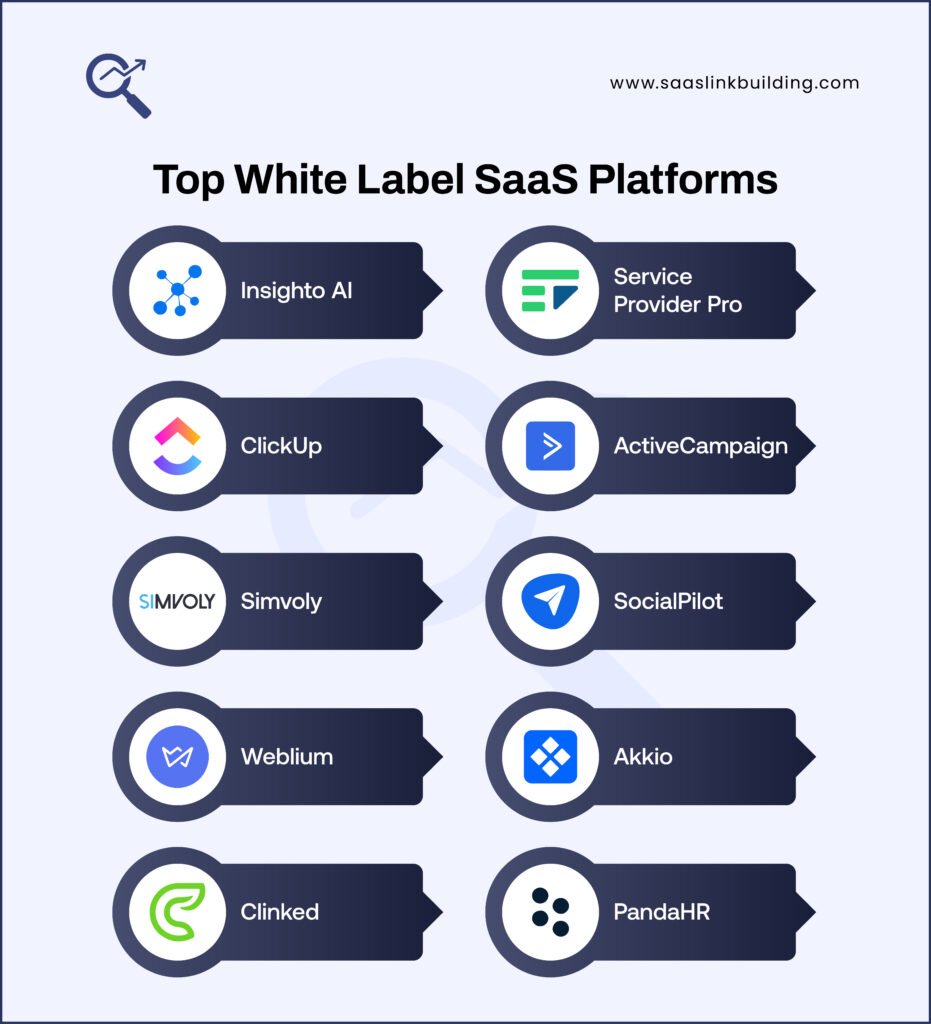
Choosing the right white-label SaaS platform is crucial. Below is a curated list of leading platforms, detailing their features, and ideal use cases.
1. Insighto AI
Overview: Insighto AI is an AI-powered analytics and reporting platform tailored for marketing agencies and SaaS resellers.
Key Features:
- Real-time performance tracking and analytics
- Fully customizable white-labeled dashboards
- Multi-client and multi-project management
- AI-driven recommendations and alerts
- API access for integrations
Ideal For: Marketing agencies, SaaS resellers, and businesses seeking advanced analytics solutions.
2. Service Provider Pro (SPP)
Overview: SPP is a white-label client portal designed for service businesses like marketing agencies and freelancers.
Key Features:
- Branded client portals and dashboards
- Invoicing and payment integrations (Stripe, PayPal)
- Service order forms and fulfillment tracking
- Team roles and permissions
- Zapier and webhooks support
Ideal For: Service-based businesses needing streamlined client management and billing solutions.
3. ClickUp
Overview: ClickUp offers customizable project management with white-label branding, making it a versatile tool for businesses of all sizes.
Key Features:
- Task management and document collaboration
- Time tracking and goal setting
- Customizable dashboards and workflows
- White-label options for branding
Ideal For: Businesses seeking an all-in-one project management solution with branding capabilities.
4. ActiveCampaign
Overview: ActiveCampaign is a marketing automation and customer relationship management platform with white-label options.
Key Features:
- Email marketing and automation workflows
- CRM and sales automation
- Landing pages and forms
- White-label capabilities for resellers
Ideal For: Marketing agencies and businesses aiming to offer branded marketing automation services.
5. Simvoly
Overview: Simvoly is a platform for building customizable websites and sales funnels with white-label options.
Key Features:
- Drag-and-drop website builder
- Sales funnel creation
- E-commerce integration
- White-label solutions for agencies
Ideal For: Agencies and entrepreneurs looking to offer website and funnel building services under their brand.
6. SocialPilot
Overview: SocialPilot is a social media management tool that allows for managing multiple accounts efficiently, with white-label options.
Key Features:
- Social media scheduling and analytics
- Client management features
- White-label reports and dashboards
Ideal For: Social media agencies and freelancers managing multiple client accounts.
7. Weblium
Overview: Weblium is a platform for building white-label websites quickly and easily.
Key Features:
- AI-powered website builder
- Customizable templates
- White-label solutions for agencies
Ideal For: Agencies and freelancers needing a fast, customizable website building solution.
8. Akkio
Overview: Akkio offers AI-driven white-label predictive analytics, enabling businesses to harness machine learning without coding.
Key Features:
- No-code AI model building
- Data visualization and dashboards
- White-label options for resellers
Ideal For: Businesses and agencies looking to offer AI analytics services under their brand.
9. Clinked
Overview: Clinked is a secure client collaboration and document sharing platform with white-label capabilities.
Key Features:
- Client portals and file sharing
- Task management and discussions
- White-label branding options
Ideal For: Professional service firms needing secure, branded client collaboration tools.
10. PandaHR
Overview: PandaHR streamlines HR processes with white-label customization, offering tools for employee management and onboarding.
Key Features:
- Employee onboarding and management
- Time tracking and leave management
- White-label options for HR service providers
Ideal For: HR agencies and consultants offering branded HR solutions to clients.
Selecting the right white-label SaaS platform depends on your business needs, target audience, and the services you aim to offer. Consider factors like customization options, scalability, support, and pricing when making your choice.
Challenges and Considerations
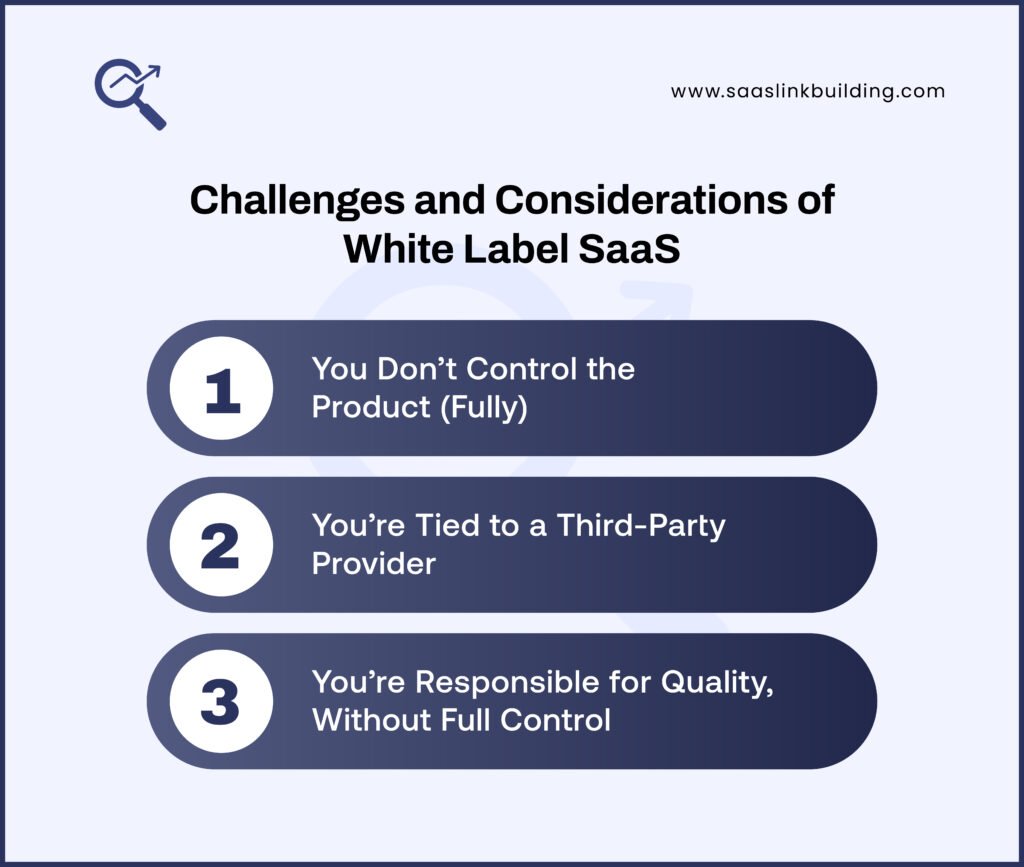
Alright, we’ve covered the awesome stuff. But let’s keep it real—white-label SaaS isn’t all sunshine and passive income. Like any business model, it comes with its own set of challenges.
Before you dive in head-first, here are a few things you’ll want to think about:
1. You Don’t Control the Product (Fully)
Here’s the deal: since you didn’t build the software yourself, you don’t have full control over how it evolves.
That means:
- You can’t instantly add new features your clients ask for.
- You have to wait for the original provider to roll out updates or fixes.
- And sometimes, those updates might not align with what you or your clients want.
If flexibility and custom features are super important to your niche, this can be a bit limiting.
Pro tip: Always partner with a provider that takes feature requests seriously and keeps improving their product.
2. You’re Tied to a Third-Party Provider
Let’s say your white-label provider has a server outage, pricing change, or decides to shut down. Scary, right?
This is one of the biggest risks—you’re relying on someone else to keep the wheels turning. And while many SaaS providers are rock solid, things can still go sideways.
So ask yourself:
- How reliable is the provider?
- Do they offer solid support?
- Are their terms of service transparent?
Make sure you’re not putting your business in the hands of someone who could vanish overnight.
3. You’re Responsible for Quality… Without Full Control
This one’s sneaky: even though you didn’t build the software, your brand is on it. So if it’s buggy, slow, or clunky—your clients will blame you.
You need to be 100% sure the software is:
- User-friendly
- Secure
- Stable
- And delivers actual value
Your reputation’s on the line, so test everything yourself before offering it to clients. Ask questions about data protection, uptime, compliance, and support.
Remember: In your client’s eyes, it’s your product. So make sure it’s something you’re proud to put your name on.
Bottom Line: White-label SaaS is powerful, no doubt. But it’s not completely hands-off.
Yes, it saves you time and money, but you still need to do your homework, choose the right partner, and keep your clients happy. If you treat it like a serious business (because it is), it can still be a low-risk, high-reward model.
How to Choose the Right White Label SaaS Platform
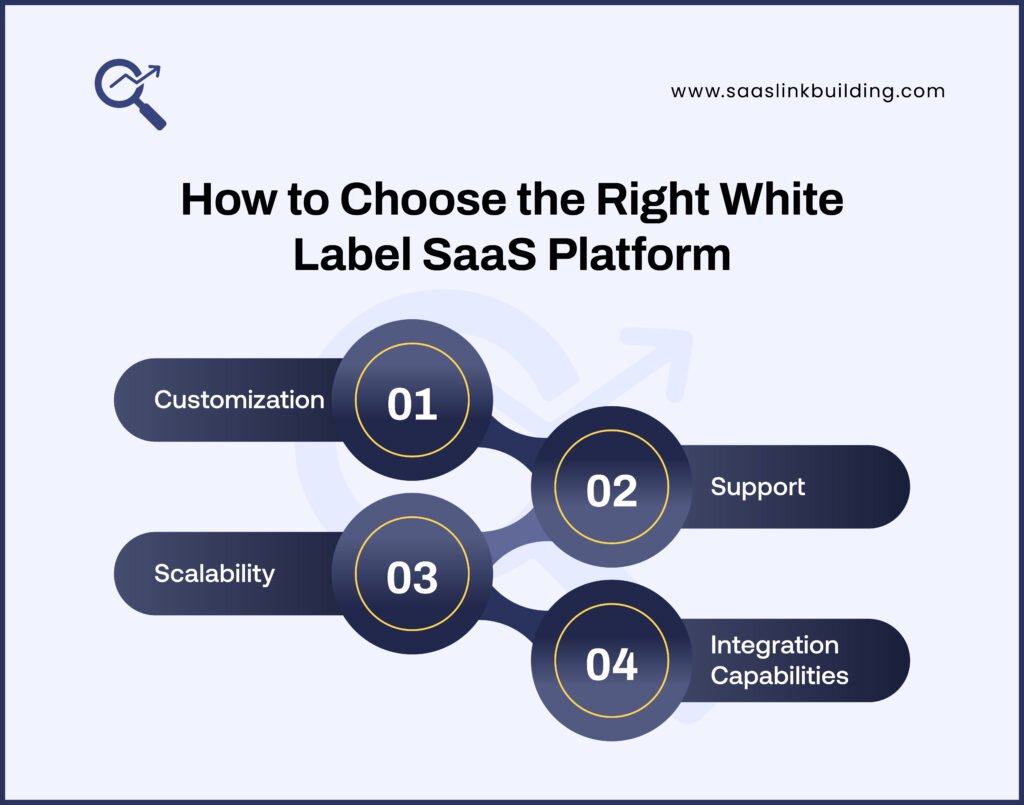
Choosing the right white-label SaaS platform can feel like walking through a tech jungle. So many features, so many promises. But if you know what to look for, making the right choice becomes way easier. Here’s how you can filter out the noise and focus on what truly matters.
1. Customization
One of the biggest perks of white-label software is the ability to brand it as your own. But here’s the catch: some platforms offer limited customization—just a logo and a color scheme—while others let you go full-on custom with dashboards, domains, emails, and even user interfaces.
Ask yourself:
Can I shape this platform to reflect my brand’s voice, feel, and flow?
> If the answer is no, it might not be the right fit.
2. Support
Great platforms don’t just offer software—they offer support that saves your day. Because let’s be honest: bugs happen. Clients ask tricky questions. And tech issues can pop up at the worst times.
What to look for:
- 24/7 support or dedicated account managers
- Comprehensive documentation or onboarding help
- Real user reviews about their responsiveness
If you’re betting your business on their platform, they should be betting their support on you.
3. Scalability
Right now, you might be managing 10 clients. What about 100 next year? Or 1,000?
A good white-label SaaS tool should scale without breaking the bank or your backend.
Check for:
- Flexible pricing tiers
- Performance at scale (load times, uptime, etc.)
- Multi-client or multi-user support
- Role-based permissions as your team grows
Choose a platform that grows with your business—not one that slows it down.
4. Integration Capabilities
This one’s big. Your platform shouldn’t live in a silo. Whether it’s connecting to CRM tools, marketing software, analytics, or third-party apps—integration is key.
Look for:
- Native integrations with tools you already use (Zapier, HubSpot, Slack, etc.)
- Robust API access if you need to build custom workflows
- Easy data import/export options
The more connected the platform, the less manual work you’ll have to do—and the smoother your operations will run.
Quick Recap (For the Skimmers):
When choosing your white-label SaaS partner, ask:
- Can I truly make it mine (branding-wise)?
- Will they support me when I hit a wall?
- Can this grow with my business?
- Will it integrate with the tools I already rely on?
Pro Tip:
Don’t just take their word for it—test the platform. Most tools offer a free trial or demo. Use that time to explore every feature, talk to their team, and visualize how it’ll work for you and your clients.
Case Studies: Real Businesses Winning with White-Label SaaS
Now that we’ve covered the “what” and “how,” let’s bring this to life with real stories. These aren’t just theories—businesses are out there making serious moves using white-label SaaS.
Here are a few standout examples that show just how powerful this model can be when executed right:
1. The Marketing Agency That Scaled Without a Dev Team
Who: A mid-sized digital marketing agency based in California
Problem: They wanted to offer clients a social media management dashboard—but building one from scratch? Not in the cards.
Solution: They white-labeled a SaaS platform like SocialPilot or Sendible, slapped their brand on it, and started offering it as an “exclusive client tool.”
Result:
- Added a new $99/month service tier
- Increased client retention by 23%
- Saved 6+ months of development time
Takeaway: They focused on value, not tech—and it paid off.
2. The Coach Who Turned Software Into Passive Income
Who: A solopreneur running online business coaching programs
Problem: Clients needed tools for goal tracking, habit building, and journaling—but she didn’t want to keep recommending third-party apps.
Solution: She discovered a white-label goal-tracking SaaS, rebranded it, bundled it into her coaching program.
Result:
- Raised her coaching prices by 20%
- Created a passive income stream from software subscriptions
- Looked 10x more professional with her “own” platform
Takeaway: White-label SaaS let her extend her brand and generate recurring income—without hiring developers.
3. The Local IT Firm That Became a SaaS Provider Overnight
Who: A small IT service provider in the UK
Problem: They wanted to stand out from competitors and offer more modern tools to their B2B clients
Solution: They white-labeled a helpdesk and ticketing system like Freshdesk or Zoho Desk, branded it, and included it in their service contracts
Result:
- Converted 60% of their existing clients to the new plan
- Increased average contract value by 32%
- Built deeper trust by “owning” the solution
Takeaway: With white-label SaaS, even small service providers can act like tech giants.
4. The Affiliate Marketer Who Launched a SaaS Brand
Who: A niche blogger/affiliate marketer in the productivity space
Problem: Wanted to move beyond affiliate commissions and own a real product
Solution: Licensed a white-label SaaS for task management, created a brand around it, and marketed it to their existing email list
Result:
- 300+ paying users in 6 months
- Higher revenue stability than affiliate links
- Full control over pricing, offers, and user experience
Takeaway: If you’ve already built an audience, white-label SaaS can turn that audience into a loyal customer base.
Bottom Line?
These aren’t unicorns or outliers. They’re normal businesses—marketers, coaches, IT firms, bloggers—who took advantage of white-label SaaS to grow faster, look more professional, and generate revenue smarter (not harder).
Whether you’re a solopreneur or a growing agency, white-label SaaS can be your shortcut to scalability—without the overhead.
Want to Market Your White Label SaaS Like a Pro?
Building a great white label product is only half the battle—marketing it effectively is what sets top players apart. From choosing the right positioning to nailing SEO, content strategy, and outreach, a solid SaaS marketing plan can take your rebranded solution from unknown to unstoppable.
Need help with scaling visibility and traffic?
Explore proven SaaS marketing strategies that actually work—and learn how to turn your white label platform into a customer magnet.
Conclusion: Is White-Label SaaS Your Next Smart Move?
By now, you’ve probably realized—white-label SaaS isn’t just a tech buzzword, it’s a game-changer for modern businesses. Whether you’re a solo entrepreneur, agency owner, or small business looking to scale, it gives you the power to offer high-value digital products without spending a fortune on development.
From cutting costs and saving time, to creating new revenue streams and looking ultra-professional—the benefits are undeniable. Of course, there are challenges too (like relying on third-party providers or dealing with limited custom control), but with the right strategy and platform, those can be managed smartly.
The real takeaway?
White-label SaaS lets you focus on what you do best—building your brand, serving your customers, and growing your business—while the tech runs in the background.
So, if you’ve been thinking about offering your own app, dashboard, tool, or platform—but the idea of starting from scratch sounds overwhelming—white-label SaaS might just be your smartest shortcut to success.
Now it’s your turn.
Start exploring the platforms we shared, compare features, and find the one that clicks with your business goals. Because in today’s fast-moving digital world, the ones who move first often win big.

